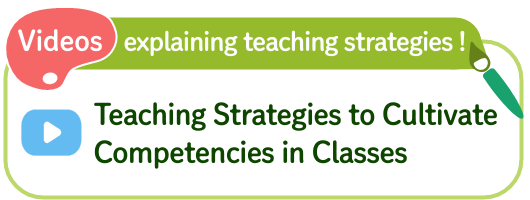Our Project
I. Project goal
Tokyo Gakugei University Research Organization for Next-Generation Education carries out the following projects with MEXT Funds of Function Reinforcement for Education and Research. Their goals are to clarify “how to foster and evaluate student competencies through elementary and junior high school subject lessons”.
- OECD/Japan Joint Research and Development of Next-Generation Teaching Approaches (2015.04~2018.03)
- OECD/Tokyo Gakugei University Joint Research Project for Developing Lesson Strategies and Evaluation Methods for Next-Generational Model of Competency Development and Their Domestic and International Promotion (2018.04~2021.03)
II. The two wheels that drive our project
In order to foster competencies that students need to thrive in the period of VUCA (volatile, uncertain, complex, and ambiguous), this project uses the following two guidelines as wheels to drive education forward: (1) OECD Education 2030: Future of Education and Skills project, and (2) MEXT New Course of Study framework of competencies and their development.
The aim of the first guideline, OECD Education 2030 project, is to come up with a proposal with the help of participating countries to answer the following questions: “For students who will be living in a complex and an uncertain world in the year 2030, (1) What knowledge, skills, attitudes and values will today’s students need to thrive in and shape their world? (2) How can instructional systems develop these knowledge, skills, attitudes and values effectively?”
This project develops in two phases. Phase One runs from 2015 to 2018 and it revises the “key competencies” proposed by OECD at the beginning of this century and suggests new concepts and modalities of competency. In this phase, (a) Knowledge, (b) Skills, and (c) Attitudes and Values are identified as the three components of competency. Phase Two is initiated from 2019 onwards based on the results obtained in the first phase. It will examine the learning environment to foster competency and build a school curriculum that will actualize the learning environment and evaluate competency.
The second guideline, MEXT New Course of Study, identifies the following three pillars that support the development of competencies: “what the student understands and what s/he can do (acquisition of “knowledge and skills” to live and work), “how the student uses what s/he understands and can do (fostering the power of “thinking, judgment and expression” to deal with unknown circumstances), and “how to engage with society and the world and live a better life (“ability to learn and develop character” applied in learning, life, and the betterment of society). To foster these competencies, MEXT is putting forth “revisions of subject lesson goals and contents from the perspective of competencies necessary for a new era” (material learned) and “improvement of learning process from the perspective of “proactive, interactive and deep learning” (learning method).
These two guidelines serve as the backdrop to our project that aims to clarify how to foster and evaluate student competencies through various efforts and research activities.
Ⅲ.We collaborate with the OECD Japan Innovative Schools Network (ISN)
Our project conducts research in collaboration with the OECD Japan Innovative Schools Network (ISN) since April 2018. ISN succeeds the OECD Tohoku School project to conduct research and devise practicum around Project-Based Learning designed primarily for high school students.






